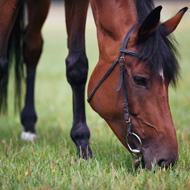Vet school research finds horse welfare needs ‘not being met’

“The research has identified how equine welfare can be improved, by addressing both the priority challenges, and a wider set of industry and horse-based needs.”
A study by the University of Bristol’s School of Veterinary Sciences was unveiled at the House of Commons. In a first of its kind, welfare organisations, breeders, the equine industry and the veterinary profession are collaborating on implementing plans to improve equine welfare.
The research, spanning four years and funded by World Horse Welfare, identified four welfare priorities that need improvement.
The report, ‘Horses in our hands’ cites unresolved stress/pain behaviour, inappropriate nutrition, inappropriate stabling/turnout and delayed death as key issues. Stakeholders from across the industry including vets, farriers, governing bodies and charities provided a broad perception of the current welfare standards.
Dr Siobhan Mullan, research fellow and contributing report author from the University of Bristol, said: “The research has identified how equine welfare can be improved, by addressing both the priority challenges, and a wider set of industry and horse-based needs.”
Areas for development included devising reliable objective measures of pain and stress and educating horse caregivers on key signs.
Another proposal was to challenge EU legislation over slaughter restrictions on horses entering the human food chain to reduce the incidence of delayed death and prolonged suffering. Educating owners on nutrition, managing stabling requirements and dispelling negative euthanasia attitudes were also recommended.
Roly Owers, World Horse Welfare representative chief executive, said: “This research will provide a valuable guide to help in driving the focus of our educational initiatives and resources over the next few years.”



 The latest
The latest